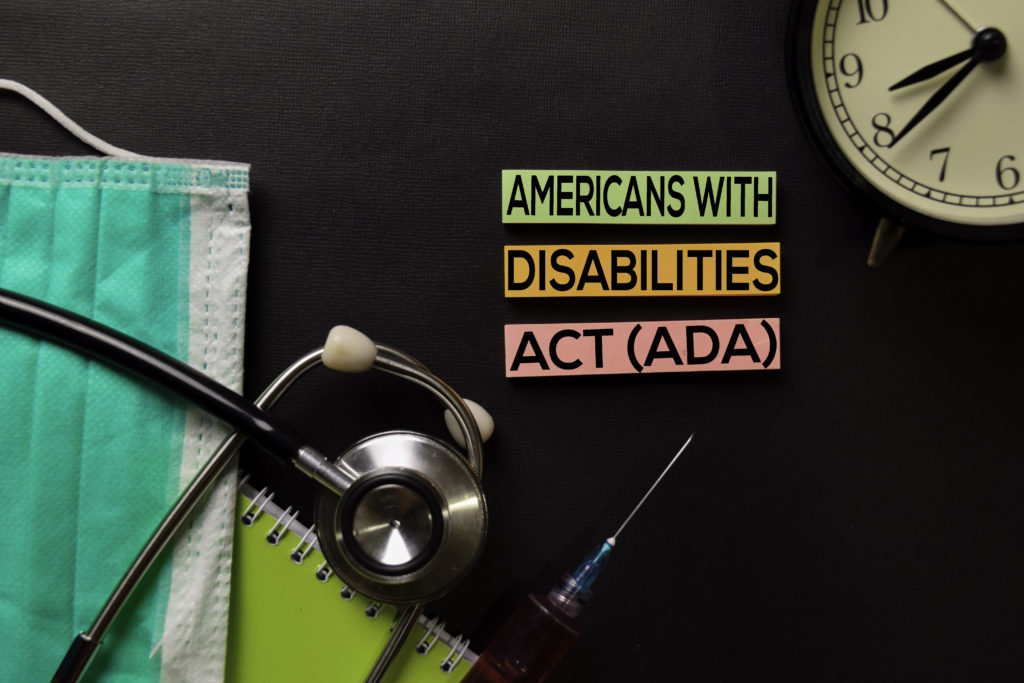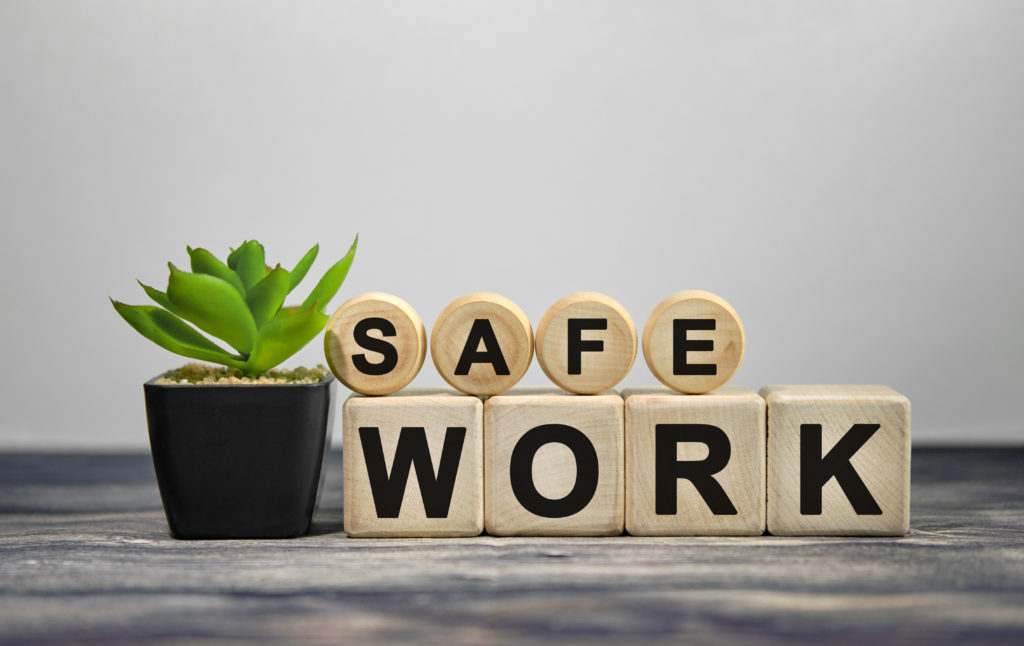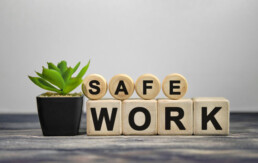Reasonable Accommodations Required During COVID-19

As the country continues to combat COVID-19, employees must be aware of their rights and ensure that their employees comply with all federal, state and local labor laws including the American with Disabilities Act (ADA). Under the ADA, federal law requires employees provide reasonable accommodations for disabilities covered under the act. However, according to the U.S. Equal Employment Opportunity Commission (EEOC), the most common complaint being filed by employees during the pandemic is employers failing to accommodate their disabilities.
The ADA has specific provisions regarding accommodations that employers must provide to employees with disabilities regardless of the extenuating circumstances due to COVID-19. Generally, the ADA requires employees to modify an employee’s job or work environment in order to ensure an employee with a disability is able perform the essential functions of their job. According to the law, the employer must make all “reasonable accommodations” as long as there is no “undue hardship.” As with many statutes, the legal definitions may not be obvious, so you should consult an experienced employment law attorney to explain the law and your rights.
The protections under the California state equivalent to the ADA are found in the California Fair Employment and Housing Act (FEHA). The FEHA protects employees with a physical or mental disability and requires employers provide reasonable accommodations such as changing work schedules, relocating the work area, modifying job duties and providing leave for medical care.
With the additional health and safety concerns due to COVID-19, all employees, particularly employees with disabilities must ensure their rights are not being violated. For example, some employees may have an underlying condition that creates a greater risk for COVID-19. Under both federal and state labor laws, the employee is entitled to reasonable accommodations to ensure their safety in the workplace if the risk is directly related to the disability.
The added health risks due to COVID-19 have impacted many aspects of labor law and the workplace, particularly if an employee has an existing qualified disability under the ADA or FEHA. Federal and state labor laws offer a wide range of protection besides accommodations. For example, all medical information of employees, related to a disability or COVID-19, must be confidential. Moreover, the ADA and FEHA provides protections to prospective employees and require hiring policies that provide equal opportunities to applicants regardless of any disability. Again, the employer must provide a reasonable accommodation to an applicant as long as it would not create an undue hardship.
If you believe your employee is violating your rights as an employee under the ADA or FEHA, you should consult an experienced employment law attorney to discuss your case and options.
FREE CONSULTATION
Srourian Law Firm, with locations in Los Angeles, Westwood, Woodland Hills, and Orange County is experienced in all aspects of employment law including ADA and FEHA violations and have aggressively represented employees in Los Angeles, Hollywood, Santa Monica, Orange, Irvine, Anaheim, Santa Ana, Newport Beach, Costa Mesa, Fullerton, Tustin, Mission Viejo, San Clemente, Garden Grove, Laguna Niguel, Brea, Fountain Valley, Aliso Viejo, Yorba Linda, Westminster, Laguna Hills, Cypress, and La Habra.
If you or someone you know suffered employment violations as an employee including ADA or FEHA violations, you may have certain employee rights under state and federal law, and may be entitled to compensation as a part of the class action lawsuit. Please contact us to speak with one of our lawyers for a free consultation.
OSHA Issues COVID-19 Workplace Safety Guidelines
Employees must know their rights as businesses around the world continue to adapt to the challenges due to the CoVid-19 pandemic. As social distancing and other safety precautions are put in place, businesses must comply with local, state and federal requirements for maintaining a safe work environment and ensure the good health and safety of employees. Most laws enacted in response to CoVid-19 vary depending on whether a business is considered essential or non-essential. For example, non-essential businesses may not compel non-essential employees to report to work, and it is illegal to retaliate against any non-essential employee who refuses to go to work. Essential workers, however, also have protections that require employers to ensure and maintain a safe workplace.
In March 2020, the Occupational Safety and Health Administration (OSHA) issued new guidelines as a result of the pandemic to clarify existing federal law that protects employees. The guidelines address the additional health risks posed by CoVid-19. Under the “General Duties Clause” enacted in 1970, OSHA (as part of the Labor Code), requires employers ensure the workplace is free from “recognized hazards” that are likely to result in serious injury or death of employees.
29 U.S. Code § 654 (5)(a)(1): shall furnish to each of his employees employment and a place of employment which are free from recognized hazards that are causing or are likely to cause death or serious physical harm to his employees.
The new OSHA guidelines, for the most part, provide guidance that follows the advice of public health officials that are already recommended for everyone such as washing hands frequently and maintaining social distancing. While the guidelines are not legally binding, they do outline recommended precautions that employers should take in order to ensure the safety of employees.
The new guidelines address four categories, or controls, for businesses to ensure employee safety: (1) engineering, (2) administrative, (3) safe work practices, and (4) personal protective equipment. The first category, engineering, identifies safety measures to separate employees with physical barriers. Administrative controls include ensuring sick employees stay home, and creating enough space for employees to stay six feet apart. Under safe work practices, OSHA recommends that company policies and practices promote good health such as providing hand sanitizer, sufficient time to wash hands frequently, and having disinfecting products available. Finally, personal protection equipment includes providing masks, gloves and eye protection to reduce the risk of exposure to CoVid-19, and would depend on the type of work and level or risk.
Additional federal, state and local laws may provide additional protection to employees. For example, in Los Angeles County, local law requires social distancing in public as well as wearing non-surgical masks by employees of essential business as well as customers. Businesses that fail to provide employees with personal protective equipment or ensure customers are wearing masks are violating the law.

FREE CONSULTATION
Srourian Law Firm, with locations in Los Angeles, Westwood, Woodland Hills, and Orange County is experienced in all aspects of employment law including OSHA violations and have aggressively represented employees in Los Angeles, Hollywood, Santa Monica, Orange, Irvine, Anaheim, Santa Ana, Newport Beach, Costa Mesa, Fullerton, Tustin, Mission Viejo, San Clemente, Garden Grove, Laguna Niguel, Brea, Fountain Valley, Aliso Viejo, Yorba Linda, Westminster, Laguna Hills, Cypress, and La Habra.
If you or someone you know suffered employment violations as an employee including OSHA violations, you may have certain employee rights under state and federal law. Employees may be entitled to damages as a part of the class action lawsuit. Please contact us to speak with one of our lawyers for a free consultation.
Employees Have a Right to be Safe at Work Amid COVID-19 Pandemic

The challenges we are all facing due to COVID-19 have resulted in many changes at home and in the workplace. While everyone must adapt to the rules of social distancing and the mandatory Safer-at-Home restrictions, essential businesses must also ensure their employees are safe at work during this pandemic. Employees of essential businesses continue to provide vital services despite the health risks, and will keep America operating. These front-line workers are important and have rights under California law to ensure their safety, health and well-being.
Under California law, employers must provide “reasonably adequate” safety devices and safeguards to keep the work place “safe and healthful.” Moreover, California Labor Code section 6401 requires “every employer shall do every other thing reasonably necessary to protect the life, safety, and health of employees.” If your employer does not protect your health and safety, they are violating the law. While this is especially challenging during the current pandemic, employees have the right to be safe in the workplace.
EMPLOYERS MUST PROVIDE MASKS, GLOVES, SOAP AND SANITIZER
Even though the current COVID-19 pandemic is unprecedented, given our understanding of the virus and how it is spread, essential workers that have contact with the public must be provided with masks, gloves, soap and sanitizing products. In addition, employees must be given time to properly wash their hands frequently, as recommended by health care organizations. Employers must also ensure that the workplace is clean and regularly sanitized for the protection of employees and customers.
According to the Centers for Disease Control and Protection (CDC) and most health care organizations, properly washing your hands with soap and water is the most effective way to prevent the spread of COVID-19 as well as other disease.
The need for safeguards in the workplace is particularly important for health care providers and first responders who are more vulnerable simply because they are more likely to be in direct contact with contagious members of the public. Every effort must be made to provide sufficient personal protective equipment (PPE) to every front-line worker to ensure their health and safety, and avoid further contagion.
State law also requires employers to reimburse employees for any expenses spent by employees to obtain necessary safety equipment. This also includes the cost of lodging if an employee is required to self-isolate because they live with someone who is considered vulnerable to the virus or has been diagnosed with the virus.
EMPLOYERS SHOULD ACCOMMODATE VULNERABLE EMPLOYEES
Employees who are considered vulnerable to the virus by having a pre-existing medical condition, may request an accommodation to work from home. If the accommodation is reasonable, the employer must accommodate the request or may violate protections granted under California’s Fair Employment & Housing Act (FEHA). Since California is under a state of emergency due to the virus, employees should know what changes have been made to provide workers with protection during the pandemic.
For example, while employers may ask employees whether they are experiencing COVID-19 symptoms, this information is confidential and the employee’s medical condition remains private. Similarly, if a co-worker has tested positive for the virus, or is believed to have the virus, the employer must follow the guidelines established by the local public health department as well as any current state or federal health recommendations. That may include closing the work place, deep cleaning and allowing employees to work remotely. Most importantly, employers cannot reveal the name of the employees that have tested positive or are suspected of having the virus.
FREE CONSULTATION
Srourian Law Firm, with locations in Los Angeles, Westwood, Woodland Hills, and Orange County is experienced in all aspects of employment law including failure to ensure a safe and healthful workplace and have aggressively represented employees in Los Angeles, Hollywood, Santa Monica, Orange, Irvine, Anaheim, Santa Ana, Newport Beach, Costa Mesa, Fullerton, Tustin, Mission Viejo, San Clemente, Garden Grove, Laguna Niguel, Brea, Fountain Valley, Aliso Viejo, Yorba Linda, Westminster, Laguna Hills, Cypress, and La Habra.
If you or someone you know suffered employment violations as an employee such as failure to ensure a safe and healthful workplace in California, you may have certain employee rights under state and federal law and may be entitled to unpaid wages, interest, attorneys’ fees and costs, and/or be entitled to compensation as a part of the class action lawsuit. Please contact us to speak with one of our experienced lawyers for a free consultation.



